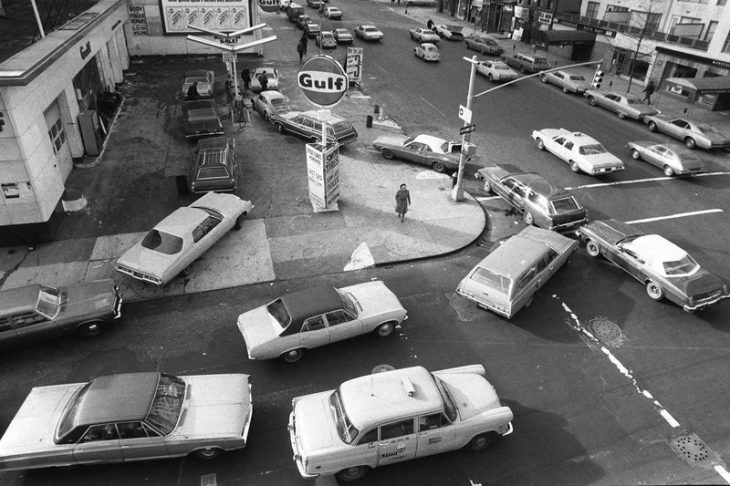
Word of the Day: Sagacious
The WordThink.com word of the day for today is sagacious. According to the website, sagacious is an adjective that means “Shrewd; showing keen mental discernment and good judgment.” It is first recorded in the language around 1600, according to www.etymonline.com, and it is derived from the noun sagacity, about which etymonline.com says, “c. 1500, from Middle French sagacité, from Latin sagacitatem (nominative sagacitas) ‘keenness of perception, quality of being acute,’ from sagax (genitive sagacis) ‘of quick perception, acute,’ related to sagus ‘prophetic,’ sagire ‘perceive keenly,’ from PIE root *sag- ‘to track down, trace, seek’ (source also of Old English secan ‘to seek;’ see seek). Also used 17c.-18c. of animals, meaning ‘acute sense of smell.’” Dictionary.com lists “having an acute sense of smell” as obsolete.
On this date 46 years ago, President Richard M. Nixon signed the Emergency Petroleum Allocation Act, passed by the Democrat-controlled House and Senate. It was a response to the embargo imposed upon the USA and a handful of other countries by the Organization of Petroleum Exporting Countries (OPEC), a group dominated by Arab countries, specifically Iraq, Iran, Saudi Arabia, and Kuwait. OPEC began this embargo to punish nations that it perceived were supporting Israel in the Yom Kippur War or Ramadan War, also known as the 1973 Arab–Israeli War, which was fought from October 6 to 25, 1973, by a coalition of Arab states led by Egypt and Syria against Israel.
The oil embargo created the first oil crisis in the US, and led to some real changes in the way we looked at oil. Gas stations put limits on how much customers could buy and still, occasionally, ran out of gas to sell. Customers waited in long lines, often just to top off their tanks in case they would be unable to find gas later. The price of gas rose almost 50% over about a one-year period, and the price of crude oil rose far more than that.
The wiki on the 1973 Oil Embargo says, “Price controls exacerbated the crisis in the US. The system limited the price of “old oil” (that which had already been discovered) while allowing newly discovered oil to be sold at a higher price to encourage investment. Predictably, old oil was withdrawn from the market, creating greater scarcity. The rule also discouraged development of alternative energies. The rule had been intended to promote oil exploration. Scarcity was addressed by rationing (as in many countries).” Further, it says, “Rationing led to violent incidents, when truck drivers chose to strike for two days in December 1973 over the limited supplies that Simon had allocated for their industry. In Pennsylvania and Ohio, non-striking truckers were shot at by striking truckers, and in Arkansas, trucks of non-strikers were attacked with bombs. America had controlled the price of natural gas since the 1950s. With the inflation of the 1970s, the price was too low to encourage the search for new reserves. America’s natural gas reserves dwindled from 237 trillion in 1974 to 203 trillion[clarification needed] in 1978. The price controls were not changed, despite president Gerald Ford’s repeated requests to Congress.”
In other words, in response to a politically-manufactured crisis, the politicians in Washington, DC, responded with regulations and controls, and, not surprisingly, these regulations and controls made the situation worse. The victims of the rationing that followed were not the politicians who enacted the laws nor the bureaucrats who enforced the regulations. Some businesses undoubtedly suffered, but they were mostly the small businesses. Mostly, average Americans suffered from the rationing and the controls, from the rules made by the Washington elites.
Did the politicians create the price controls in order to hurt people. Probably not. The fact of the matter is that the people who rule over us are not particularly sagacious. They think they are, which is part of the problem, because they never question their own decisions, their own wisdom. They just assume that their wisdom and their experience will lead to positive outcomes, and, sadly, it makes no difference to them how many times they are proven wrong.
Of course, it doesn’t matter at what level of governance these political types work at. They can be presidents, dictators, representatives, mayors, police chiefs, or even just college presidents, provosts, or deans. Especially when they’ve been in power for a few years, they come to believe in their own discernment and judgment despite frequent failures. And often they will not brook disagreement. After all, they are where they are because of their sagacity, right?
The image is from the NPR website: “Cars line up in two directions at a gas station in New York City on Dec. 23, 1973.”